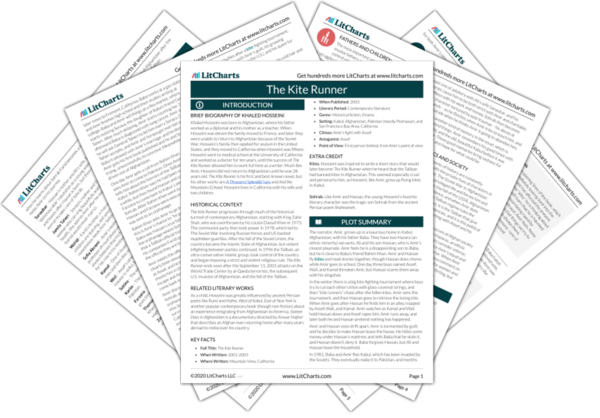Betrayal
The betrayal of a loyal friend by a wealthier, more corrupt “master” is a recurring motif in The Kite Runner, and Amir and Baba’s feelings of guilt for their betrayals drive much of the novel’s action. The central betrayal comes when Amir watches and does nothing as Hassan, who has always stood up for Amir in the past, gets raped by Assef. Amir then worsens the betrayal by driving Ali and…
read analysis of BetrayalRedemption
The quest for redemption makes up much of the novel’s plot, and expands as a theme to include both the personal and the political. Throughout his childhood, Amir’s greatest struggle was to redeem himself to Baba for “killing” his mother during childbirth, and for growing up a disappointing son who was unlike Baba himself. After Hassan’s rape, Amir spends the rest of his life trying to redeem himself for his betrayal of his…
read analysis of RedemptionFathers and Children
The most important relationships in The Kite Runner involve fathers and their children, usually sons. The central relationship is between Baba and Amir, as Amir struggles to win his father’s affections and Baba tries to love a son who is nothing like him. When Amir learns that Baba is Hassan’s father as well, he realizes that Baba also had to hide his natural affection for Hassan – an illegitimate son who was also…
read analysis of Fathers and Children
Violence and Rape
Rape occurs several times in The Kite Runner as the ultimate act of violence and violation (short of murder) that drastically changes the lives of both the characters and the country. The central act of the novel is Amir watching Hassan’s rape by Assef. There are more peripheral instances of rape as well – it is implied that Kamal, one of Hassan’s tormentors, was raped by soldiers, and Baba saves a woman…
read analysis of Violence and RapeMemory and the Past
Throughout The Kite Runner, many characters are haunted by memories of the past. Amir is constantly troubled by his memory of Hassan’s rape and his own cowardice, and it is this memory that leads Amir to his final quest for redemption. Baba is also haunted by his past sins of adultery with Ali’s wife Sanaubar, and his memories cause him to be both strict with Amir and charitable and selfless with…
read analysis of Memory and the PastPolitics and Society
The movements of history are constantly interfering with the private lives of characters in The Kite Runner. The Soviet War in Afghanistan interrupts Amir’s peaceful, privileged life and forces him and Baba to flee to America. After the fall of the USSR, Afghanistan continues to be ravaged by violence, and when Amir does finally return to find Sohrab, the Taliban regime rules the country with violent religious laws. It is the Taliban…
read analysis of Politics and Society






